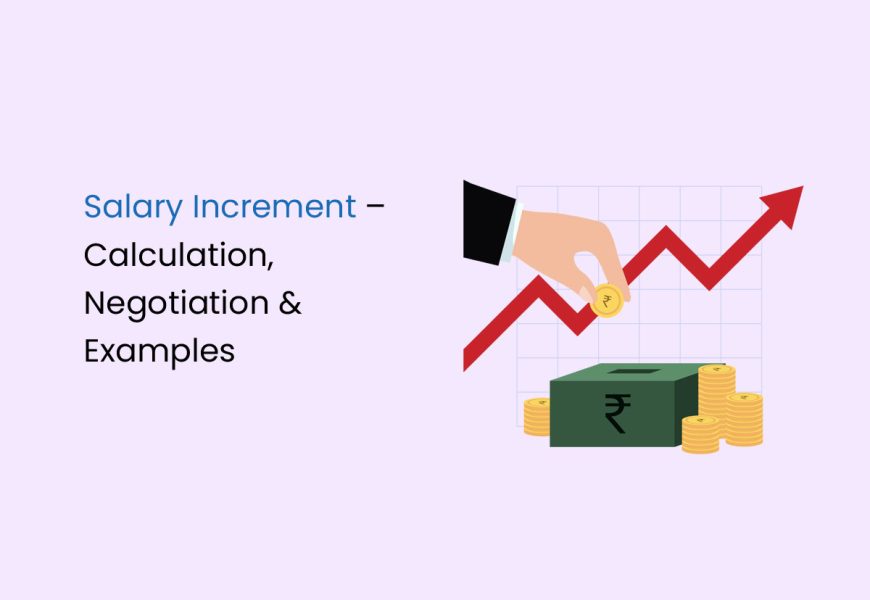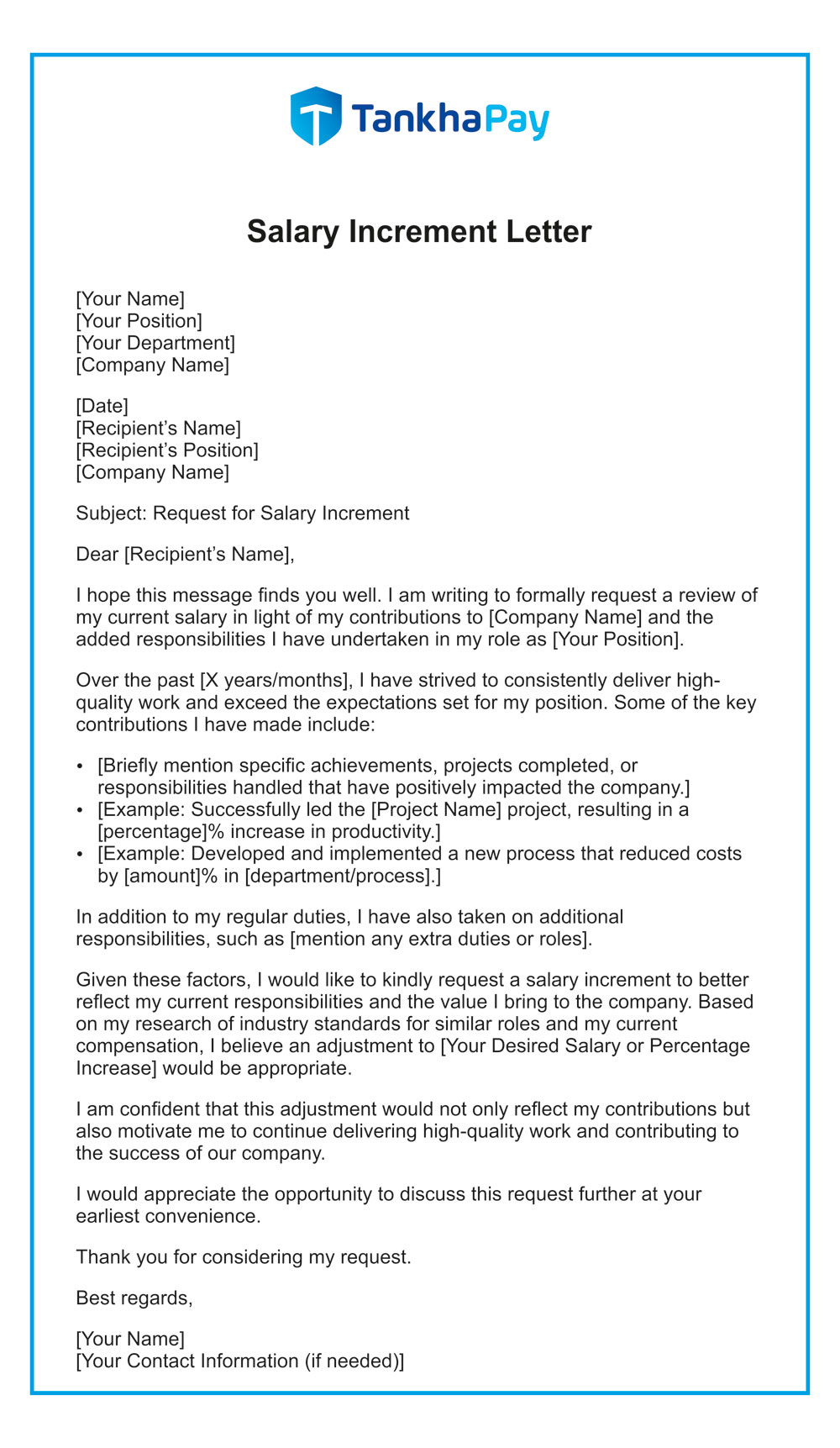A salary increment letter formally requests the employer to raise your current salary. This letter should be concise and professional & Persuade our employer to accept your request, and your letter clearly justifies why you deserve an increment in your salary. In this article, we guide you on how to draft an effective salary increment letter along with format and samples.
Importance of Salary Increment Request Letter?
A well-drafted salary increment letter works as proof of your request, and it allows you to be prominent in your work and provides a compelling case for salary adjustment, representing your professionalism and confidence in your work.
Simple Steps to Writing a Salary Increment Letter
- Choose the right person: Email your letter directly to your reporting manager, the Department of HR, or the person responsible for managing the salary decisions in your workplace.
- Clear the purpose of your letter first: Begin your letter with the object of your letter.
- Make Sure to mention your achievements: List achievements, contributions & accomplishments and how they have positively impacted the organization.
- Justify your salary increment letter request: Provide a valid reason to grant your request based on your performance and increase job responsibility, such as company standards.
- Professional and Polite: While mentioning your achievements and points on salary increment, maintain a professional & Respectful tone throughout the email.
- End with a Positive Note: Express gratitude for the opportunities provided and show your willingness to discuss further.
Salary Increment Letter Format
[Recipient’s Name]
[Recipient’s Designation]
[Company Name]
[Date]
Subject: Request for salary increment
Dear Mr./Mrs. {Recipient’s Name},
I am writing to formally request a review of my current salary. I have been serving as a {designation} in the {company name} since {joining date}.
In my tenure here, I have consistently demonstrated dedication and hard work, ensuring timely deliverables without any lapses. The impact of my work is reflected in the increased engagement and readership of the content I produce for our company.
Considering my commitment and the tangible results achieved in content performance, I believe it is appropriate to revisit my current compensation. The current CTC for my role is notably below the industry average for this position. Therefore, I am seeking a minimum increment of 20% in my salary.
I am confident that my contributions align with the company’s goals, and I look forward to discussing this matter further if needed.
Thank you for considering my request.
Best regards,
Yours sincerely,
[Your Full Name]
[Your Signature]
[Your Email Address]
[Your Contact Number]
Salary Increment Letter in Different Format
| Formats | Files |
|---|---|
Salary Increment Letter in Word |
Download |
Salary Increment Letter in Pdf |
Download |
Salary Increment Letter for Employee
[Recipient’s Name]
[Recipient’s Designation]
[Company Name]
[Date]
Subject: Salary Increment Notification
Dear Mr./Mrs. {Recipient’s Name},
We extend our warm congratulations to you for your outstanding contributions and dedication to the objectives of {company name}. It gives us immense pleasure to inform you of a salary increment as a token of appreciation for your hard work.
Effective from {date}, your revised annual CTC will be increased by {amount}.
The details of your new salary structure are as follows:
– Previous Salary (CTC per annum): {amount}
– Increment: {amount}
– New Salary (CTC per annum): {amount}
For a comprehensive breakdown of the salary structure and any additional details, please feel free to reach out to the HR department.
We anticipate your continued dedication and look forward to your success with {company name}. Wishing you a prosperous and fulfilling career ahead.
Best Regards,
[Your Full Name]
[Your Signature]
[Your Email Address]
[Your Contact Number]
Salary Increment Letter from Employer to Employee
HR Manager
NP Technologies
New Delhi
3rd April 2025
Subject: Salary Increment
Dear Vivek,
We are pleased to inform you that, as a result of an appraisal of your Dedication, hard work, and valuable contribution to (Organization Name), we have included an increment in your Salary. Effective (Date), or New Monthly/annual Salary Will be (New Salary Amount). The new salary structure is as follows:
Previous Salary: Rs. (Previous Amount)
Increment: Rs. (Previous Amount)
Increment Percentage: (Enter Percentage Amount)
New Salary: (Enter Amount Of New Salary)
This Salary Increment demonstrates your Dedication, consistent performance, and the work you have given to your work achieving our organizational goals. We immensely appreciate your efforts to word the company and look forward to your continued success.
If you have any questions about this salary Increment, please get in touch with the HR Department.
Yours truly,
Signature
Partho Mukhrjee
HR Manager
Salary increment Letter For Assistance Professor
Assistant Professor
ABC International College
Delhi
3rd April 2025
To,
The Manager
ABC International college
Delhi
Subject: Salary Appraisal Request
Dear Sir/Madam,
I hope this email finds you well. I would like a formal review and revision of my Salary, as I have served as an Assistant Professor at this college for the past five years.
Over the past five years, I have dedicated myself to my profession and diligently contributed to the college through research, teaching and academic services. Also, I have taken additional responsibilities ( mention your key responsibilities such as research, publication, and mentoring of students & duties related to the administration), which positively affect both the administration and students.
I’d also like to draw your attention to the fact that my Salary as an assistant professor is significantly lower than the average annual Salary for my position. Kindly Consider my contributions and the prevailing salary structure. I want to request an increase in my salary structure.
I would appreciate the opportunity to discuss the matter further at your convenience. Kindly let me know an appropriate time for a meeting to review my consent.
Thank you for your time and consideration. I look forward to your positive response.
Thanking you,
Yours Sincerely,
Signature
Rajendra
Assistant Professor
Salary Increment Letter for Teachers
[Recipient’s Name]
[Recipient’s Designation]
[Company Name]
[Date]
Subject: Request for Salary Revision
Dear Mr./Mrs. {Recipient’s Name},
I am writing to formally request a review of my current salary as a {position} at {school name}. I have been a part of the esteemed institution since {joining date}.
Throughout my tenure, I have remained a devoted and diligent educator, consistently maintaining perfect attendance and actively contributing to various student-centric initiatives. The positive academic performances of my students stand as a testament to my commitment to their learning and growth.
Considering my dedicated service and the positive impact on student outcomes, I believe it is fitting to reconsider my current compensation. I kindly request an increment of a minimum of 20% in my salary.
I am open to discussing this matter further at your convenience and appreciate your time and consideration.
Thank you for your understanding.
Yours sincerely,
[Your Full Name]
[Your Signature]
[Your Email Address]
[Your Contact Number]
Salary Increment Letter Request Email to HR
Dear Mr./Mrs. {Recipient’s Name},
I hope this email finds you in good health. I am reaching out to formally request a reconsideration of my current salary. I have had the privilege of serving as a {designation} at {company name} since {joining date}.
I have consistently demonstrated commitment and diligence in executing my responsibilities throughout my tenure. I take pride in maintaining impeccable attendance and meeting deadlines, contributing to the substantial growth and enhanced visibility of our company’s {your responsibilities}.
Reflecting on my contributions and considering industry standards, I find that my current compensation is inconsistent with my efforts and the prevailing market averages. Hence, I am seeking a modest increment of 22% in my salary.
This adjustment appropriately reflects my dedication to {company name} and aligns with industry norms. I have attached a detailed overview of my monthly work performance for your convenience.
I would be grateful for an opportunity to discuss this matter further at your earliest convenience. Your understanding and consideration are greatly appreciated.
Thank you for your time.
Best regards,
[Your Full Name]
[Your Signature]
[Your Email Address]
[Your Contact Number]
[Attachment: Monthly Work Performance Review]
Follow Up email for Salary Increment to HR
Dear Mr./Mrs. {Recipient’s Name},
I trust this email finds you well. I am writing to follow up on the salary increment request letter I submitted to you two weeks ago. Regrettably, I have not received any response or acknowledgement regarding the matter.
I understand that you are undoubtedly busy, and I appreciate your time and consideration. However, as my financial situation is becoming more challenging, I am reaching out to kindly request you to review my salary increment proposal at your earliest convenience.
Your attention to this matter is crucial to me, and I would be grateful for any updates or insights you can provide.
Thank you for your understanding and consideration.
Best regards,
[Your Full Name]
[Your Signature]
[Your Email Address]
[Your Contact Number]
How to Calculate Your Salary Increment Percentage?
To ascertain the Salary Increment Percentage, it is essential to comprehend the key components involved in its calculation:
- Gross Salary: Gross salary encompasses all the earnings of an employee, comprising not only the base salary but also additional components such as commissions, tips, incentives, dividends, interest, and other supplemental forms of compensation.
- Net Salary: Net salary represents an employee’s residual income after deducting various contributions and withholdings from the gross salary. These deductions may include taxes, insurance premiums, and other mandatory contributions.
- Take-Home Salary: The term “Take-Home Salary” is synonymous with net salary. It denotes the actual amount that an employee receives in their bank account or as a paycheck after all deductions have been accounted for, providing a clear picture of their disposable income.
Understanding these components is crucial in determining the Salary Increment Percentage, as it involves evaluating the increase in the overall compensation, factoring in both the gross and net salary elements. This comprehensive approach ensures a thorough assessment of the financial adjustments made in recognition of an employee’s performance, tenure, or other relevant considerations.
How to Determine Salary Increment?
Determining salary increments involves a multifaceted evaluation, considering various factors to ensure a fair and strategic approach. The key determinants include:
- Performance Evaluations and Appraisals: Employee performance is a fundamental factor influencing salary increments. Regular assessments and appraisals help gauge an individual’s contributions, accomplishments, and adherence to set objectives.
- Industry and Company’s Financial Condition: The financial health of both the industry and the company plays a pivotal role. Economic conditions, market trends, and the organisation’s financial stability influence the ability to allocate resources for salary increments.
- Seniority Level of an Employee: The level of seniority an employee holds within the organisation often correlates with salary increments. Longer tenures and higher positions may be rewarded with more substantial increases.
- Taking on Additional Responsibilities and Developing New Skills: Employees who assume additional responsibilities or actively work on enhancing their skill set are likely to be considered for higher increments. Demonstrating a commitment to personal and professional growth is valued.
- Contribution to the Company’s Success: Those who significantly contribute to the company’s success, whether through increased revenue, cost savings, or innovation, are often rewarded with more substantial salary increments.
- Maintaining Positive Feedback and Recognition: Consistent positive feedback, recognition for achievements, and a constructive attitude contribute to an employee’s overall profile, impacting salary increments. Employers value a positive and collaborative work ethic.
- Market Value of the Position, Skills, and Experience: The market value of the employee’s position, along with their skills and experience, is a crucial benchmark. Salary increments need to align with industry standards to attract and retain talent.
- Budget Constraints and Company Policies: The overall budget allocated for employee compensation and company policies regarding salary adjustments also play a role. Organisations need to balance rewarding employees with financial constraints and adhere to internal guidelines.
Salary Increment Letter Samples
To assist you in the process of learning how to ask for a salary increment, we have written multiple samples for you to consider before you write your own.
How to Negotiate a Salary Increment with an Employee?
Ensuring timely recognition and rewarding deserving employees is necessary to maintain a positive work atmosphere and retain valuable talent. The negotiation process for a salary increment involves proactive measures and transparent communication.
- Initiate Proactively: Employers should not wait for employees to initiate requests for a salary increment. Proactive identification of deserving candidates is crucial to fostering a culture of recognition.
- Scheduled Discussion: Arrange a one-on-one meeting with the identified employee to delve into the subject of a potential salary increment. This personalised setting allows for a focused and constructive conversation.
- Open and Transparent Dialogue: Encourage an open and transparent conversation during the meeting. Allow employees to articulate their expectations and highlight their contributions to the organisation.
- Explain Decision-Making: Clearly articulate the reasons behind the approval or disapproval of the salary increment. Provide constructive feedback on the employee’s performance and contributions to enhance understanding.
- Fair Conclusion: Collaboratively work towards a conclusion that is fair to both the employee and the employer. Consider market standards, the employee’s contributions, and any budgetary constraints.
- Communication of Next Steps: Clearly communicate the next steps in the process. Whether it involves implementing the approved increment or outlining a roadmap for improvement, set clear expectations for the future.
- Proactive Employee Engagement: Foster a culture of open feedback within the organisation. Utilise performance reviews, engagement surveys, and other data to identify employees deserving of recognition proactively.
- Active Listening and Understanding: During one-on-one discussions, actively listen to the employee’s perspectives. Seek to understand their value proposition and contributions to the company’s success.
- Positive Closure: Ensure that the employee leaves the discussion on a positive note. Address any uncertainties and provide guidance on the next steps to maintain a positive relationship.
- Continuous Feedback Loop: Establish a continuous feedback loop to address ongoing employee concerns and aspirations. Regularly assess and adjust compensation strategies to align with organisational goals.
Explore More Sample Letters
FAQs about Salary Increment
When is the best time to ask for a raise?
The best time to ask for a raise is typically after being with the company for one year. This timeframe allows employees to demonstrate their value and contributions to the organisation, making a stronger case for a salary increase.
How do I write the salary increment letter?
When writing a salary increment letter, include the following details in the specified format:
- Your name, designation, and ID number
- Date and address
- Addressee's name, designation, company, and address
- Subject of the letter
- Salutation
- Purpose of the letter, i.e., asking for an increment
- Your date of joining and the number of years you have worked for the company
- Detailed information about your achievements and accomplishments
- Amount or percentage of increment you are seeking
- Conclusion with thanking the addressee
- Sign off
- Your name and signature
Is a promotion letter and a salary increment letter the same?
While both letters involve changes in compensation, a salary increment letter primarily focuses on notifying an employee about a salary increase. In contrast, a promotion letter includes details about a salary hike and informs the employee about their new job position and the added responsibilities that come with the promotion.






















